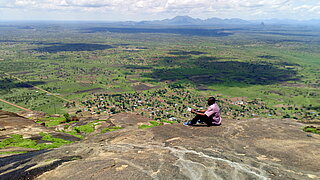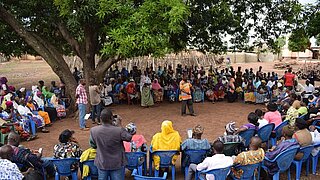Participation of all interests as a recipe for success

IKI project using the landscape approach to combine environmental protection and economic development in the partner countries in Africa.
The effective and equitable management and governance of natural resources is an essential precondition for protecting landscapes, exploiting their economic opportunities and involving all stakeholders. Over the past two decades, the landscape approach has established itself as a successful method. This approach is understood as the integrated management of ecosystems: taking into consideration the different and competing social, cultural, economic and ecological interests with the goal of reconciling conservation and the economic development of a landscape.
Practical examples demonstrate that the conservation and sustainable use of natural resources in protected areas mutually benefits biodiversity and people. Value-added chains can be created and the sustainable livelihoods of the population within jointly managed protected areas and in their immediate vicinity can be secured by way of participatory management and multi-stakeholder platforms that take all actors into consideration. Both increase the awareness and acceptance of nature conservation. A decision-making process that takes the interests of all stakeholders into consideration, therefore, improves the results.
The PLUS approach to form lasting institutions for inclusive decision-making
The landscape approach is also the key instrument of the “Africa Stabilizing Land Use (PLUS)” project, promoted by the International Climate Initiative (IKI) and implemented by the International Union for Conservation of Nature (IUCN). It aims to increase the potential for the conservation of biological diversity on agricultural and forest land in four African countries. It focuses on areas with a high value of biological diversity, in which deforestation and land degradation pose constant threats. For this purpose, it improves the governance of natural resource in six landscapes, including Wassa Amenfi and Mole National Park in Ghana, Agoro-Agu and Mount Elgon in Uganda, Kilombero Valley in Tanzania and the Mangaï in the Democratic Republic of Congo (DRC). The landscape approach provides stakeholders from all levels and sectors with the opportunity to introduce their interests, perspectives and values concerning the management of natural resources.
As neutral multi-stakeholder platforms, the IKI project utilises the Land Use Dialogues (LUDs). They are used to explore what challenges exist and what solutions are possible. LUDs help shape fairness, justice and equality in decisions. This is important, as their success largely depends on the extent of inclusion of the diverse actors and their capacity to engage with the process and advocate for their rights.
In each project area, the LUDs were the starting point for establishing Governance Working Groups (GWGs). The groups comprise of representatives from competing interests. GWGs attempt to identify the respective priorities in the landscapes and develop strategies for sustainable management from local to national level. They present the structures required to encourage regular dialogue and to promote capacity-building and decision-making on issues around sustainable landscape management.
Renaissance of a protected area in the Democratic Republic of Congo

An example of how the landscape approach can be realized is seen on the work of the PLUS project in the Democratic Republic of Congo. The governance and management of the Mangaï Reserve protected area in the southwest of the country is under the Congolese Institute for Nature Conservation (ICCN). Despite ICCN’s efforts, a lack of funds led to the deterioration of the reserve’s management infrastructure.
The management of the reserve not only lacked fundamental tools such as reliable data, but also a development and management plan that would have guided decision-making for optimal resource use. Furthermore, the borders of the reserve were not clearly marked and unknown to many stakeholder groups, including administrative officials. This has led to the substantial degradation of the Mangaï Reserve.
The Democratic Republic of Congo committed to restoring eight million hectares of forest landscape as part of the Bonn Challenge. The Bonn Challenge is a vital international initiative for rebuilding forests. By 2020, the African countries involved intend to complete the reforestation of about 150 million hectares of forest under the Bonn Challenge. As part of this contribution, the government of the Democratic Republic of Congo chose the PLUS project with the Mangaï landscape. As a first step, the IKI project developed a strategic planning tool for rebuilding the protected area, in particular a land use and management plan.
Taking all interests into account
The data collection phase required for this purpose took place in a participatory manner with a bottom-up approach, starting from civil society. Consultations were organised via LUDs with stakeholders from the Idiofa and Oswhe areas. This produced focus groups comprising a variety of stakeholders contributing to the protected area. Among other things, their work enabled the confirmation of the borders of the Protected Area. The process mobilised more than 200 people, including the area administrator, the council chairperson, the political-administrative authorities, the planning unit of the reserve, traditional authorities, and representatives from civil society and the fishing, hunting, livestock breeding, agriculture and wood sectors, and women association.
Two focus groups for increased animal protection were then formed, including important actors from local governance, such as the head of administration, traditional chiefs, hunters and anglers from the Oshwe Territory in the Mangai Reserve. They discussed strengthening the conservation of animal species such as horned animals, monkeys, large carnivores, wild boar, mustelids, pangolins, elephants and hippos. Data on the inclination of presence, frequency and distribution of the species in the area was shared with stakeholders. The discussions also covered additional information on significant cultural ties to these animals.
Representatives of the GWG, which was formed in August 2018, held a working session for the integration of stakeholder comments into the land use and management plan. The adopted management plan was then presented for validation to the deputies of the National Assembly for the Idiofa and Oshwe regions, the IUCN, representatives of non-governmental organisations intervening in the Idiofa landscape, various ICCN executives and the head of the Mangaï reserve. They all welcomed the preparation of the management plan and suggested adjustments in specific details, such as the names of certain villages and sector borders.
After validation, the entire document was submitted to the National Administration of the ICCN as an officially acknowledged land use and management plan.
Participation as the key to success
The Mangaï Management Plan helped the government to reposition itself in the region as a protected area manager. The new plan also strengthened the role and support of local communities in the governance of the protected area. The GWG, led by the communities, is recognised explicitly in the management plan as responsible for the governance of the protected area at the local level, strengthening the power of the communities in monitoring their rights throughout the entire landscape.
The management plan for the Mangaï Reserve, developed in a participatory process, contributes to long-term conservation outcomes, and contribute implementation of national community conservation strategy. The key to success was the participation and active consultation of the local communities throughout the entire process. Without this, the transition from theory to policy to practice and adoption of the plan could not have been achieved.
The success and knowledge acquired in Mangaï can help other protected areas in the Democratic Republic of Congo to develop or revise their management plans.
The knowledge and experience gained from the PLUS project for integrative governance in and around protected areas were also presented at the African Protected Area Congress in July 2022.
The link has been copied to the clipboard
Contact
IKI Office
Zukunft – Umwelt – Gesellschaft (ZUG) gGmbH
Stresemannstraße 69-71
10963 Berlin


